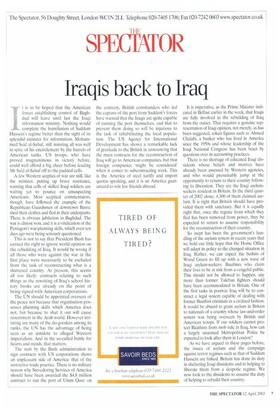Iraqis back to Iraq
1 t is to be hoped that the American forces establishing control of Bagh dad will leave until last the Iraqi information ministry. Nothing would complete the humiliation of Saddam Hussein's regime better than the sight of its splendid minister for information, Mohammed Said al-Sahaf, still insisting all was well in spite of his encirclement by the barrels of American tanks. US troops, who have proved magnanimous in victory before, could well afford a big cheer before leading Mr Said al-Sahaf off to the padded cells.
A few Western sceptics of war are still, like the minister, putting up brave resistance, warning that cells of skilled Iraqi soldiers are waiting yet to pounce on unsuspecting Americans. Most sceptical commentators, though, have followed the example of the Republican Guardsmen of downtown Basra: shed their clothes and fled in their underpants. There is obvious jubilation in Baghdad. The war is almost won, and it is a vindication of the Pentagon's war-planning skills, which even ten days ago were being seriously questioned.
This is not to say that President Bush has earned the right to ignore world opinion on the rebuilding of Iraq. It would be wrong if all those who were against the war in the first place were necessarily to be excluded from the task of reconstructing what is a shattered country. At present, this seems all too likely: contracts relating to such things as the rewriting of Iraq's school history books are already on the point of being signed with American corporations.
The UN should be appointed overseer of the peace not because that organisation possesses planning skills which America does not, but because to shut it out will cause resentment in the Arab world. However irritating are many of the do-gooders among its ranks, the UN has the advantage of being seen as an antidote to alleged Western imperialism. And in the so-called battle for hearts and minds, that matters.
The rush by the Bush administration to sign contracts with US corporations shows an unpleasant side of America: that of the restrictive trade practice. There is no military reason why Stevedoring Services of America should have been awarded the $4.8 million contract to run the port of Umm Qasr; on the contrary, British commanders who led the capture of the port from Saddam's forces have warned that the Iraqis are quite capable of running the port themselves, and that to prevent them doing so will be injurious to the task of rehabilitating the local population. The US Agency for International Development has shown a remarkable lack of gratitude to the British in announcing that the main contracts for the reconstruction of Iraq will go to American companies, but that foreign companies 'might he considered' when it comes to subcontracting work. This is the America of steel tariffs and import quotas speaking, and it is an America guaranteed to win few friends abroad.
It is imperative, as the Prime Minister indicated in Belfast earlier in the week, that Iraqis are fully involved in the rebuilding of Iraq from the outset. That requires a genuine representation of Iraqi opinion, not merely, as has been suggested, token figures such as Ahmed Chalabi, a banker who has lived in America since the 1950s and whose leadership of the Iraqi National Congress has been beset by questions over its accounting practices.
There is no shortage of educated Iraqi dissidents whose beliefs and motives have already been assessed by Western agencies, and who would presumably jump at the opportunity to return to their country following its liberation. They are the Iraqi asylumseekers resident in Britain. In the third quarter of 2002 alone, 4,300 of them claimed asylum. It is right that Britain should have provided them with sanctuary. But it is equally right that, once the regime from which they fled has been removed from power, they be expected to return to assume responsibility for the reconstruction of their country.
So inept has been the government's handling of the asylum system in recent years that we hold out little hope that the Home Office will adapt its policy to the changed situation in Iraq. Rather, we can expect the bedsits of Wood Green to fill up with a new wave of Iraqi asylum-seekers: Baathists who claim their lives to be at risk from a vengeful public. This should not be allowed to happen, any more than former Taleban fighters should have been accommodated in Britain. One of the first tasks in postwar Iraq will be to construct a legal system capable of dealing with former Baathist criminals in a civilised fashion. It would be absurd to grant asylum in Britain to nationals of a country whose law-and-order system was being overseen by British and American troops. If our soldiers cannot protect Baathists from mob rule in Iraq, how can a largely unarmed Metropolitan Police be expected to look after them in London?
As we have argued in these pages before, the issues of asylum and the campaign against terror regimes such as that of Saddam Hussein are linked. Britain has done its duty in sheltering Iraqi dissidents and in helping to liberate them from a despotic regime. We now look to the dissidents to assume the duty of helping to rebuild their country.


































































 Previous page
Previous page